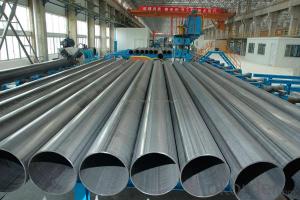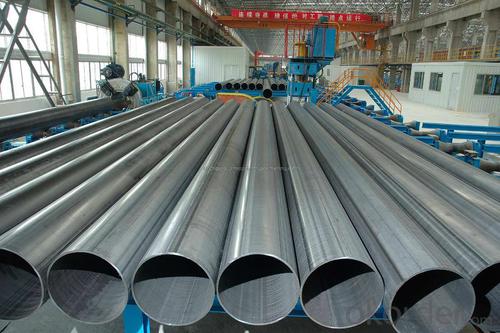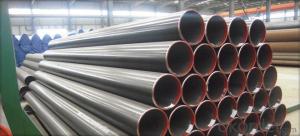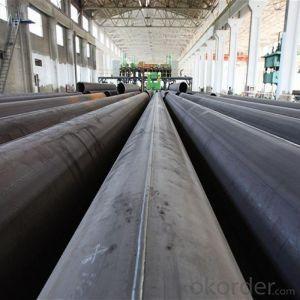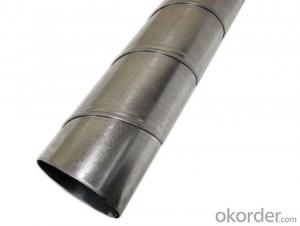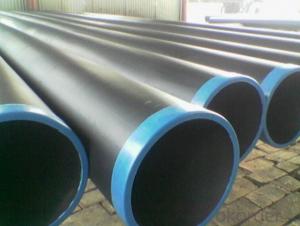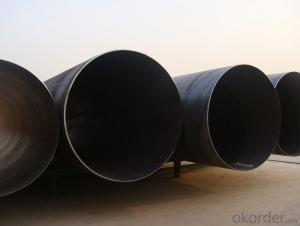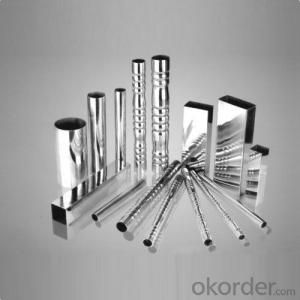LSAW STEEL PIPE 32''
- Loading Port:
- China Main Port
- Payment Terms:
- TT OR LC
- Min Order Qty:
- -
- Supply Capability:
- -
OKorder Service Pledge
OKorder Financial Service
You Might Also Like
Packaging & Delivery
Packaging Detail: | Normal exporting packing,in container or bulk vessel or as per clients' request |
Delivery Detail: | 2 months after confimed contract |
Specifications
Large Diameter API 5L X70 PSL2 LSAW Steel Pipe
Grade: X42, X46, X50, X52, X60, B, C
OD: 1.5"-28"
WT: SCH10-SCH160
Brand:TPCO
Large Diameter API 5L X70 PSL2 LSAW Steel Pipe
Specifications:
u Standard: API 5L
u Grade: B, C, X42, X46, X50, X52, X56, X60, X65, X70, X80
u OD: 1.5"-28"
u WT: SCH10-SCH160
u Length: 5-12m
u Ends Finish: plain end, bevel end, grooved end
u Surface Treatment: bare, black varnished, oiled finish, red color, anti-corrosion, 3PE, FBE or epoxy coating
u Technique: hot rolled or cold drawn
u Application: api 5l steel pipe for conveying oil, water, gas
u Invoicing: based on theoretical weight or actual weight
u Payment Terms: L/C at sight, T/T or Western Union
u Trade Terms: FOB, CFR, CIF
u Certification: ABS manufacturing assessment, ABS design assessment, API 5CT, API 5L, DNV manufacturer certificate, ISO9001 quality management system certificate, ISO14001 environment management system certificate, GB/T28001 occupational health and safety management system certificate, A1 class manufacturing license of special equipment certificate, CCS, GL, LR, SGS, TüV, PDE
- Q: What are the different methods of pipe coating for steel pipes?
- There are several methods of pipe coating for steel pipes, including fusion-bonded epoxy (FBE) coating, three-layer polyethylene (3LPE) coating, three-layer polypropylene (3LPP) coating, and liquid epoxy coating. Each method offers different levels of protection against corrosion, abrasion, and other environmental factors, ensuring the durability and longevity of the steel pipes.
- Q: What are the factors that affect the pressure rating of steel pipes?
- There are several factors that can affect the pressure rating of steel pipes. 1. Material strength: The strength of the steel used in the pipe construction plays a crucial role in determining its pressure rating. Higher strength steel can withstand higher pressure levels, whereas weaker grades of steel may have lower pressure ratings. 2. Wall thickness: The thickness of the pipe wall directly impacts its pressure rating. Thicker walls can handle higher pressure levels as they provide more resistance against the internal forces exerted by the fluid or gas flowing through the pipe. 3. Pipe diameter: The diameter of the steel pipe also influences its pressure rating. Generally, larger pipes have higher pressure ratings as they have a larger cross-sectional area to distribute the internal pressure forces. 4. Temperature: Elevated temperatures can significantly affect the pressure rating of steel pipes. High temperatures can weaken the steel material, reducing its overall strength and, consequently, its pressure rating. Therefore, it is important to consider the maximum operating temperature when determining the pressure rating of steel pipes. 5. Corrosion resistance: Corrosion can weaken the pipe material over time, leading to a decrease in its pressure rating. Various factors such as the type of fluid being transported, pH levels, and environmental conditions can impact the corrosion resistance of steel pipes. Utilizing corrosion-resistant coatings or selecting stainless steel pipes can help mitigate this factor. 6. Manufacturing standards: Compliance with recognized industry standards and specifications is crucial in determining the pressure rating of steel pipes. These standards ensure that the pipes are manufactured using proper techniques and materials, providing reliable and accurate pressure ratings. 7. External loads: External loads or forces acting on the pipes, such as soil settlement, traffic loads, or installation practices, can affect their pressure rating. Proper design and installation techniques, including adequate support and protection, are essential in ensuring the pipes can withstand these external forces without compromising their pressure rating. It is important to consider all these factors and consult relevant industry standards and guidelines to determine the appropriate pressure rating for steel pipes in different applications.
- Q: Can steel pipes be used for conveying food and beverages?
- Steel pipes can be used for conveying food and beverages, but certain precautions need to be taken to ensure their safety and suitability for this purpose. Firstly, it is important to choose food-grade stainless steel pipes that are specifically designed for handling food and beverage products. These pipes are made from high-quality stainless steel that is resistant to corrosion and does not leach harmful substances into the food or beverage. Secondly, the pipes should be properly cleaned and sanitized before and after each use to maintain hygiene standards. Regular cleaning and maintenance will prevent the accumulation of bacteria or contaminants that could potentially contaminate the food or beverage being transported. Additionally, it is crucial to consider the compatibility of the food or beverage with the steel pipes. Certain acidic or corrosive substances may react with the steel, causing contamination or compromising the integrity of the pipes. In such cases, alternative materials like food-grade plastic or rubber may be more suitable. Overall, steel pipes can be used for conveying food and beverages, but it is essential to ensure the use of food-grade stainless steel pipes, proper cleaning and sanitization, and compatibility with the specific food or beverage being transported. Following these guidelines will help maintain the safety and quality of the food or beverage during transportation.
- Q: Can steel pipes be used for underground culverts?
- Yes, steel pipes can be used for underground culverts. Steel pipes are known for their strength, durability, and resistance to various environmental factors, which makes them suitable for underground applications. They can withstand heavy loads, high water pressure, and the corrosive effects of soil and water. Additionally, steel pipes are available in various sizes and thicknesses, allowing for customization to fit specific project requirements. However, it is important to consider factors such as the soil conditions, water table levels, and potential for corrosion when selecting the appropriate type of steel and protective coatings for the pipes.
- Q: What are the advantages of using steel pipes in the manufacturing of storage tanks?
- There are several advantages of using steel pipes in the manufacturing of storage tanks. Firstly, steel pipes are known for their strength and durability, making them suitable for holding large volumes of liquids or gases. They can withstand high pressure and extreme weather conditions, ensuring the longevity of the storage tank. Additionally, steel pipes are resistant to corrosion, which is crucial for preventing leaks or contamination of the stored materials. Moreover, steel pipes can be easily welded, allowing for efficient and precise construction of storage tanks. Finally, steel pipes have a high recyclability rate, making them an environmentally friendly choice for storage tank manufacturing.
- Q: What are the factors to consider when selecting steel pipes for a specific application?
- When selecting steel pipes for a specific application, factors such as pipe diameter, wall thickness, material grade, corrosion resistance, temperature and pressure requirements, environmental conditions, and cost should be considered. Additionally, factors like durability, strength, weight, ease of installation, and compatibility with other components in the system should also be taken into account.
- Q: What are the different types of steel pipe tees?
- There are three main types of steel pipe tees: equal tee, reducing tee, and barred tee.
- Q: How are steel pipes protected against external damage?
- Steel pipes are protected against external damage through various methods such as coatings, wraps, and cathodic protection. These protective measures help prevent corrosion, abrasion, and other forms of external damage, ensuring the durability and longevity of the pipes.
- Q: How are steel pipes classified based on pressure ratings?
- Steel pipes are classified based on pressure ratings into various categories such as Schedule 40, Schedule 80, and Schedule 160, with each schedule indicating the maximum pressure the pipe can withstand.
- Q: How are steel pipes used in the manufacturing of fire sprinkler systems?
- Steel pipes are commonly used in the manufacturing of fire sprinkler systems due to their durability and fire resistance properties. These pipes serve as a reliable conduit for water or fire suppression agents to flow through, ensuring that the sprinkler system effectively extinguishes fires. The high strength of steel pipes allows for the construction of a robust and long-lasting system that can withstand high pressure and heat, making them an ideal choice for fire safety installations.
Send your message to us
LSAW STEEL PIPE 32''
- Loading Port:
- China Main Port
- Payment Terms:
- TT OR LC
- Min Order Qty:
- -
- Supply Capability:
- -
OKorder Service Pledge
OKorder Financial Service
Similar products
Hot products
Hot Searches
Related keywords
